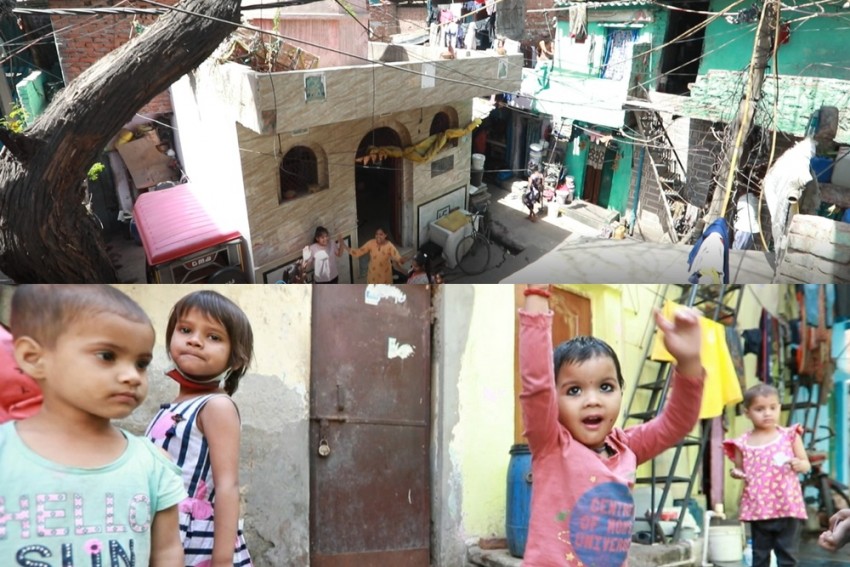Online Education | When Children Who Can’t Afford Books Are Asked To Learn On Computers
Online Education | When Children Who Can’t Afford Books Are Asked To Learn On Computerson Apr 22, 2021

 Jyoti and Kiran study from the only mobile phone in the family . (Picture credit: Simi Chakrabarti)
Jyoti, 17, closes her book with a pencil in between to mark the page, because she and her sister Kiran have to leave for work. Since their mother is suffering from Typhoid, both the sisters have to work as domestic helpers in the residential area of Vivek Vihar. Between them, they earn Rs 4000, which is the monthly income of their family comprising seven members. The girls are in a rush - they have 'Class 12th Pre-board exam' the very next day. Kiran quickly wraps up the household work, Jyoti gets up to give medicine to her mother and they leave.
Here I am in a colony where existence is a struggle and proper education a luxury.
Were the pandemic and the lockdowns not enough to wreck their lives that this online education came to further widen the gap between these children and the quality education they deserve? In a community where students were not able to buy their books; affording laptops, mobiles and stable internet connections is an unattainable dream. Online Education - What the government and the coaching industry claim to be the future of education, is right in front of me wearing its hopeless present.
“When we could not attend online classes for the first two months of the lockdown, our teacher called and suggested arranging a phone for at least two hours daily,” Kiran tells me. “We tried borrowing a phone and somehow managed for a couple of days. But when the exams started and we had no resources to study, our mother borrowed money from where she works and got us a phone. It has been 6-7 months and she is still paying instalments of that phone.”
Their father worked as a daily wage mason and is unemployed since the announcement of the lockdown. They haven’t paid their rent for the past 8 months and are living in the 25 guz room at the mercy of the generous landlord.
Jyoti bursts into tears as she recalls the lockdown days and those never-ending queues where they had to stand for the only meal of the day. “When we couldn’t afford food, how did they expect us to buy a phone?” she asks wistfully. (In the whole conversation, they never even mentioned a laptop. Truly, imagination sprouts from reality.)
Jyoti and Kiran study from the only mobile phone in the family . (Picture credit: Simi Chakrabarti)
Jyoti, 17, closes her book with a pencil in between to mark the page, because she and her sister Kiran have to leave for work. Since their mother is suffering from Typhoid, both the sisters have to work as domestic helpers in the residential area of Vivek Vihar. Between them, they earn Rs 4000, which is the monthly income of their family comprising seven members. The girls are in a rush - they have 'Class 12th Pre-board exam' the very next day. Kiran quickly wraps up the household work, Jyoti gets up to give medicine to her mother and they leave.
Here I am in a colony where existence is a struggle and proper education a luxury.
Were the pandemic and the lockdowns not enough to wreck their lives that this online education came to further widen the gap between these children and the quality education they deserve? In a community where students were not able to buy their books; affording laptops, mobiles and stable internet connections is an unattainable dream. Online Education - What the government and the coaching industry claim to be the future of education, is right in front of me wearing its hopeless present.
“When we could not attend online classes for the first two months of the lockdown, our teacher called and suggested arranging a phone for at least two hours daily,” Kiran tells me. “We tried borrowing a phone and somehow managed for a couple of days. But when the exams started and we had no resources to study, our mother borrowed money from where she works and got us a phone. It has been 6-7 months and she is still paying instalments of that phone.”
Their father worked as a daily wage mason and is unemployed since the announcement of the lockdown. They haven’t paid their rent for the past 8 months and are living in the 25 guz room at the mercy of the generous landlord.
Jyoti bursts into tears as she recalls the lockdown days and those never-ending queues where they had to stand for the only meal of the day. “When we couldn’t afford food, how did they expect us to buy a phone?” she asks wistfully. (In the whole conversation, they never even mentioned a laptop. Truly, imagination sprouts from reality.)
 Jyoti and her sister, Kiran, talk to their mother, who is under treatment for tuberculosis. (Picture credit: Simi Chakrabarti)
“Everything was delayed because of the pandemic - food, shelter, wages, studies…But we were asked to pay our fees on time. Why?” asks Kiran. In a family with a monthly income of 4000, Jyoti, Kiran and their brother had to borrow and pay 7500 fees to be able to give their board exams.
I see a momentary smile on their faces when I ask about their dreams for the future. With a sparkle in her hazel eyes, Kiran jumps up and returns with some drawings in her hand. I cannot stop but wonder at the sheer beauty of her paintings. With the very talented girl standing beside me, her fine sketches in my hand and her hapless reality in front of me, I cannot muster the courage to look into her eyes.
When I turn to Jyoti, she tells me, “I have two dreams (she giggles). One, I want to be a teacher…”
“And?” I ask. She pauses for a bit and says, “I wish to own a study table of my own. I wish I had a study room like the children in public schools have.” I am speechless.
Jyoti and Kiran take me to their friend Neha’s place. After returning from work, the three of them wind up their daily chores and then study together at night. Neha’s father died from prolonged illness a month before the lockdown. Her mother is a domestic helper who earns 6000 a month to feed her four daughters, Neha the eldest.
Neha: A book in one hand, a ladle in the other
When I saw Neha for the first time, she had a ladle spoon in one hand and a book in the other. She was preparing for her exam and her right hand was busy making Dalia for her youngest sister. Like other children in the areas, online education is out of the question for Neha and her sisters. After her father’s demise, she had to work as a domestic helper and ironed clothes for residents of Vivek Vihar. After borrowing money, their mother arranged a mobile which is used by one sister at a time. Meanwhile, the other three have to miss their classes.
Jyoti and her sister, Kiran, talk to their mother, who is under treatment for tuberculosis. (Picture credit: Simi Chakrabarti)
“Everything was delayed because of the pandemic - food, shelter, wages, studies…But we were asked to pay our fees on time. Why?” asks Kiran. In a family with a monthly income of 4000, Jyoti, Kiran and their brother had to borrow and pay 7500 fees to be able to give their board exams.
I see a momentary smile on their faces when I ask about their dreams for the future. With a sparkle in her hazel eyes, Kiran jumps up and returns with some drawings in her hand. I cannot stop but wonder at the sheer beauty of her paintings. With the very talented girl standing beside me, her fine sketches in my hand and her hapless reality in front of me, I cannot muster the courage to look into her eyes.
When I turn to Jyoti, she tells me, “I have two dreams (she giggles). One, I want to be a teacher…”
“And?” I ask. She pauses for a bit and says, “I wish to own a study table of my own. I wish I had a study room like the children in public schools have.” I am speechless.
Jyoti and Kiran take me to their friend Neha’s place. After returning from work, the three of them wind up their daily chores and then study together at night. Neha’s father died from prolonged illness a month before the lockdown. Her mother is a domestic helper who earns 6000 a month to feed her four daughters, Neha the eldest.
Neha: A book in one hand, a ladle in the other
When I saw Neha for the first time, she had a ladle spoon in one hand and a book in the other. She was preparing for her exam and her right hand was busy making Dalia for her youngest sister. Like other children in the areas, online education is out of the question for Neha and her sisters. After her father’s demise, she had to work as a domestic helper and ironed clothes for residents of Vivek Vihar. After borrowing money, their mother arranged a mobile which is used by one sister at a time. Meanwhile, the other three have to miss their classes.

Education
Education News
Frontlist
Frontlist education News
Frontlist India news
Frontlist Latest
Frontlist News
Latest news
online education
Online Education poor kids
Online Education school
poor kids Online Education

.jpg)
.jpg)
.jpg)
.jpg)
.jpg)
.jpg)

.jpg)
.jpg)
.jpg)
.jpg)


_(1).jpg)
.jpg)










Sorry! No comment found for this post.